Small islands, big voices – Caribbean voices unite at historic ICJ climate change hearings
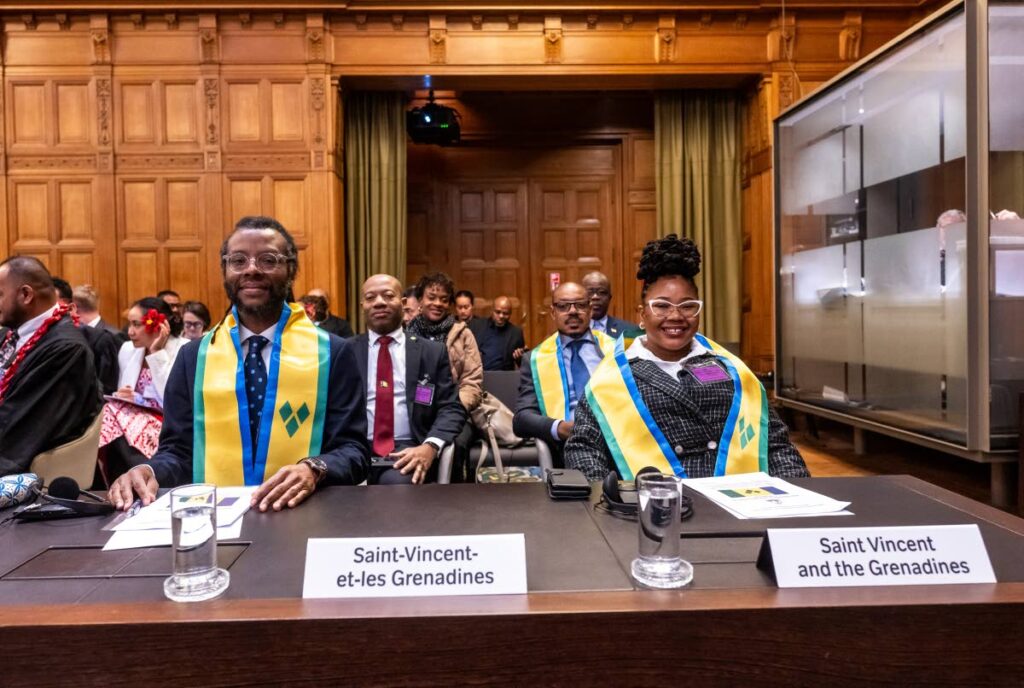
A total of ten Caribbean countries highlighted the often devastating and deadly effects climate change has on the region at the International Court of Justice (ICJ).
Through powerful videos depicting flooding and destruction from natural disasters, along with heartfelt appeals from prime ministers and government officials, they conveyed a united message on the urgent need for action.
Earlier this year, a record-breaking 91 countries submitted written statements to the court seeking an advisory opinion on states’ obligations regarding climate change.
Some countries that did not give written statements took the opportunity to give oral presentations at the hearings from December 2-13.
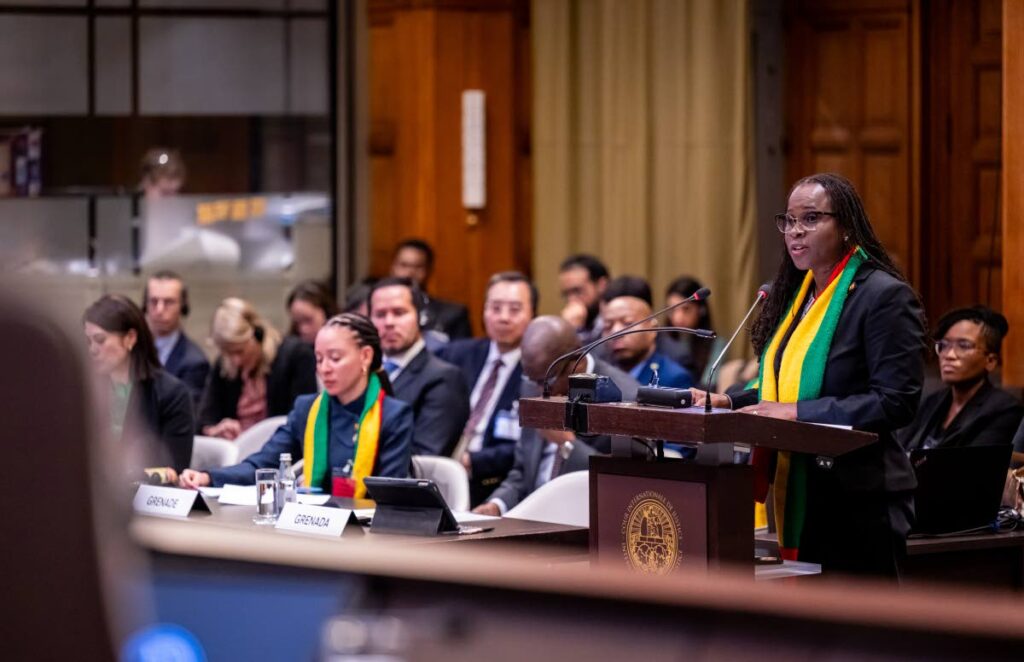
In total, 96 countries presented orally, as well as 11 international organisations.
The idea of going to the ICJ was first proposed by Vanuatu, a South Pacific island, in 2021.
Caricom then pledged full support for 2022.
Among the Caribbean countries to give written or oral statements were Antigua and Barbuda, The Bahamas, Barbados, Belize, Dominica, Grenada, Jamaica, the Dominican Republic, St Vincent and the Grenadines and St Lucia.
What is an advisory ICJ decision?
The ICJ says despite its advisory opinions being non-binding (having no legal power), they “carry great legal weight and moral authority.”
It explains, “Contrary to judgments, and except in rare cases where it is expressly provided that they shall have binding force, the court’s advisory opinions are not binding.
“The requesting organ, agency or organisation remains free to decide, as it sees fit, what effect to give to these opinions.
But despite this, it says its advisory decisions are often “an instrument of preventive diplomacy and help to keep the peace.
“In their own way, advisory opinions also contribute to the clarification and development of international law and thereby to the strengthening of peaceful relations between states.”
Grenadian PM, AG: A struggle against climate-induced debt
Grenada’s presentation began with an emotional video showing the devastation caused this year by Hurricane Beryl.
Grenadian prime minister Dickon Mitchell, who spoke via video, said the lives of citizens were literally “turned upside down.
“The destruction was heartbreaking. Every sector of our economy felt Beryl’s wrath. Our infrastructure, homes, schools, churches, public hospitals and even our newly built solar farm were destroyed. Sea-level rise has caused even the graves of our loved ones to be swallowed up by the ocean.”
He said Grenada is facing the “vicious financial cycle” of having to rebuild after every extreme climatic event.
“The international community must recognise this debt and take decisive action to address this harm through financial compensation, reparations and technical support.”
Grenada’s attorney general Claudette Joseph spoke of the “dire situation” at the Tibeau cemetery in Carriacou.

“(It) is now mostly engulfed by the sea.
“Families with loved ones buried at Tibeau mourn doubly. They are not able to engage in the Tombstone Feast, a traditional cultural practice that pays homage to their ancestors, neither can they take part in the annual All Saints tradition common throughout Grenada.
“For our people, losing Tibeau to climate change is not just about losing graves. It is losing cultural and traditional practices that connect us to our ancestors and define who we are.”
She, too, highlighted the impact of Hurricane Beryl, averaging the losses and damage to infrastructure as costing US$220 million.
“Grenada produces more than 20 per cent of the world’s nutmeg. After Hurricanes Ivan and Emily, nearly 85 per cent of the nutmeg crop was affected…A nutmeg tree takes ten-12 years to mature and up to 30 years to yield maximum. As such, our export revenue from nutmeg never recovered after Hurricane Ivan. And, while our farmers were recovering, Hurricane Beryl struck, sending the sector backwards once more in just a few hours.
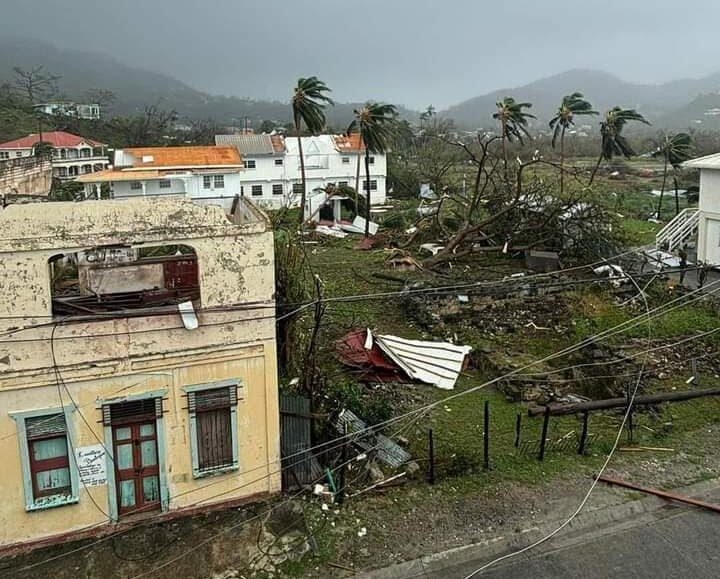
“Mr president, members of the court, this is not misfortune, this is injustice. And Grenada asks the question: How can this be allowed to continue?”
She added that Grenada is lobbying for debt restructuring for all SIDS (small-island developing states), improved access to climate funds and scaled-up support to the Loss and Damage Fund.
Antigua and Barbuda PM: A crisis we didn’t create
Antigua and Barbuda prime minister Gaston Browne said his country is “on the frontline of a global climate emergency.”
He added that existing action has not adequately addressed this issue.
“For decades, Antigua and Barbuda has experienced the grave consequences of climate change. Rising sea levels, driven by the unchecked emissions of greenhouse gases, have eroded our coastlines, swallowing land that is vital to our country. Ocean temperatures have risen, disrupting the delicate ecosystems that sustain our fisheries, an essential source of food and livelihoods. More frequent and intense weather events have destroyed homes, decimated infrastructure, and left scars on the lives of our people that no amount of financial aid can truly heal.”
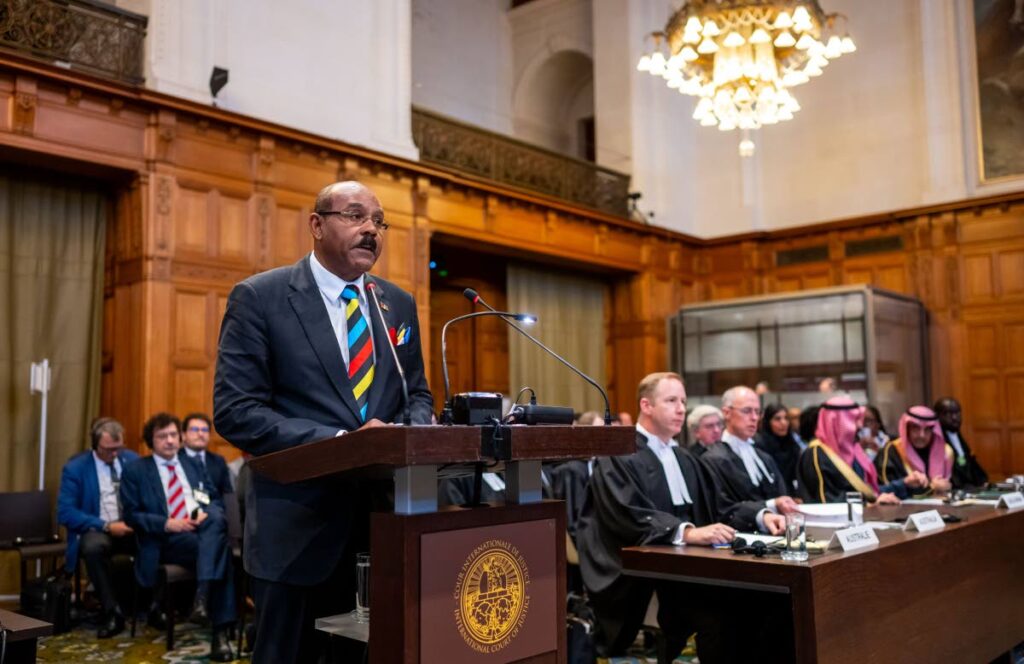
He said in 2017, Hurricane Irma was a “turning point” for his country as Barbuda “did not stand a chance” against it.
“If we were not a single state, the people of Barbuda would have had to literally seek refuge elsewhere.”
Highlighting that the government spent years rebuilding at an “immense cost” which increased its debt, he said, “Large, wealthy countries can borrow on their capital markets at three per cent per annum, (while) the so-called ‘high income’ SIDS, like Antigua and Barbuda, must borrow commercially at 10 per cent to finance repeated rebuilding of infrastructure damaged by hurricanes caused by the failure of other states to mitigate emissions.”
He said the advisory opinion is not being sought to point fingers but to, instead, clarify states’ obligations under international law “before the clock on our survival runs out.
“We ask: What must small states, or states generally, do, under international law, to protect the climate system for present and future generations? What is the responsibility of those whose actions have contributed disproportionately to this crisis?”
He concluded, “Antigua and Barbuda stands in solidarity with other vulnerable nations, particularly our fellow small island states. Together, we endure the worst of a crisis that we did not create.”
Barbados’ foreign affairs minister: A matter of life and death
Kerrie Symmonds, Barbados’ minister of foreign affairs and trade, said the climate crisis is “an imminent matter of life and death.”
He stressed that the issue is not merely statistical, theoretical or speculative.
“For people of SIDS such as mine, there is nowhere to go when confronted with rising sea levels; there is no hinterland, there is no interior, there is no area of as yet unexplored territory…”
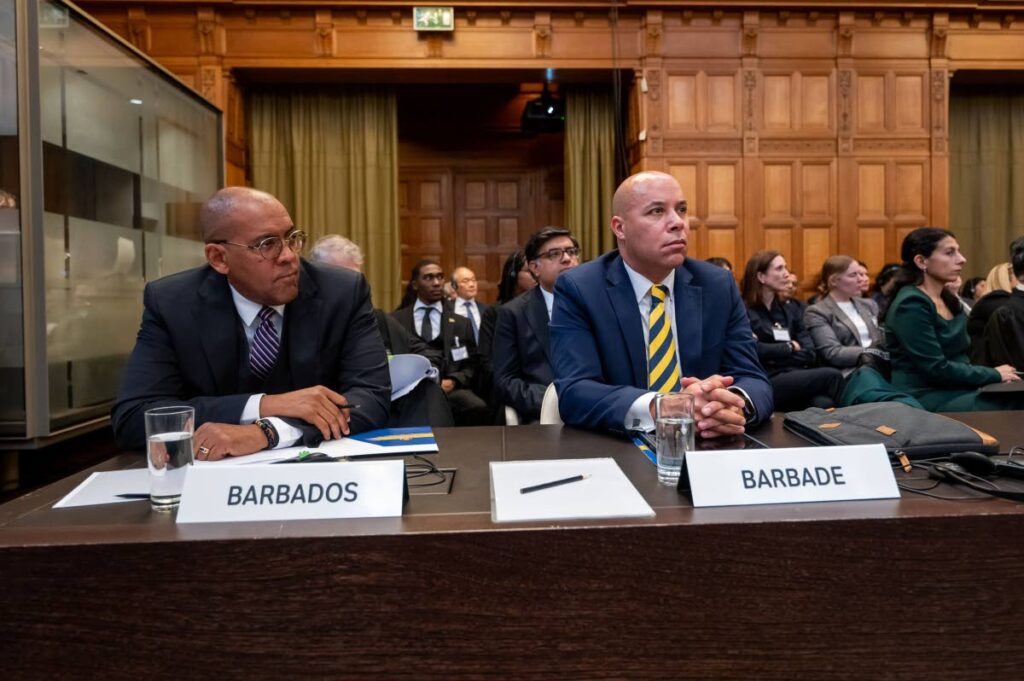
He continued, “The tourism sector, which has buoyed our economic fortunes for the better part of a century is now at risk. The fishing sector which has been a sustainable source of protein for generations of Barbadians, thousands of Barbadians, is now at risk. The sugarcane industry, which we have grown for hundreds of years and from which we have distilled a world-famous rum, is also at risk.”
He said the recent hurricane Beryl destroyed 90 per cent of Barbados’ fishing fleet, among other things.
“Storms like Beryl, periods of prolonged periods of drought, slow-onset phenomena such as sea-level rise and rising temperatures are the catastrophic ‘new normal’ which has become our lived reality.
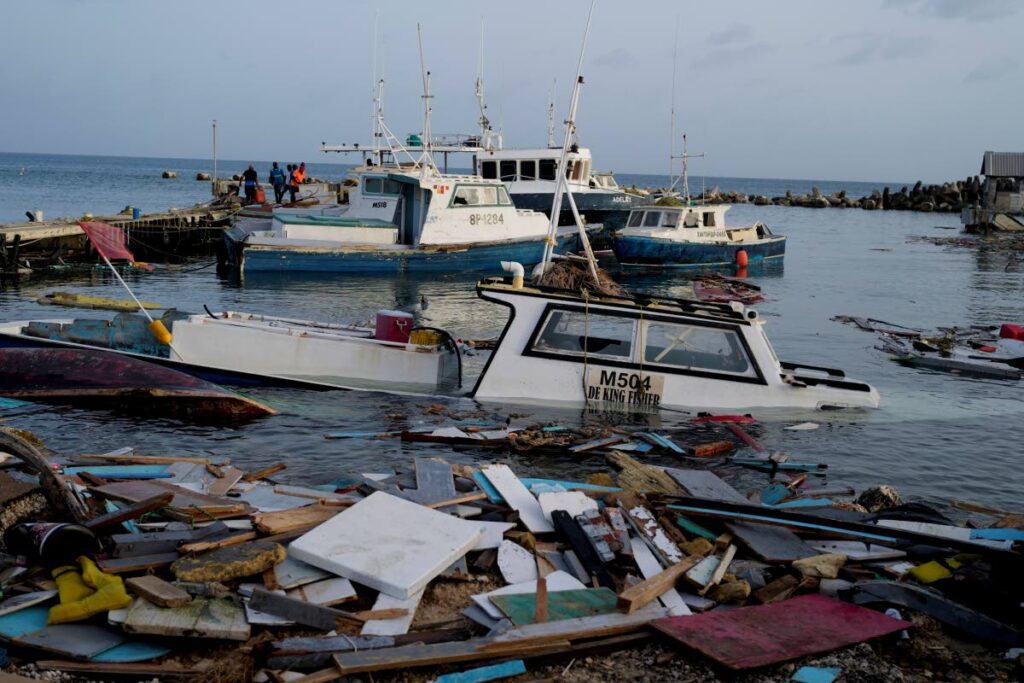
“Barbados contends, and science clearly demonstrates, that these are the consequences of this man-made climate crisis. A crisis towards which Barbados and SIDS have contributed almost nothing, but which may take away everything that we have.”
St Vincent and the Grenadines: Colonisation on repeat
St Vincent and the Grenadines also began their contribution with a video titled The Race: Survival vs Death and Debt. It showed the destruction caused by natural disasters.
Shernell Hadaway, parliamentary Counsel III at the Attorney General’s Chambers in St Vincent and the Grenadines, told the court that was the reality which “haunts” her country.
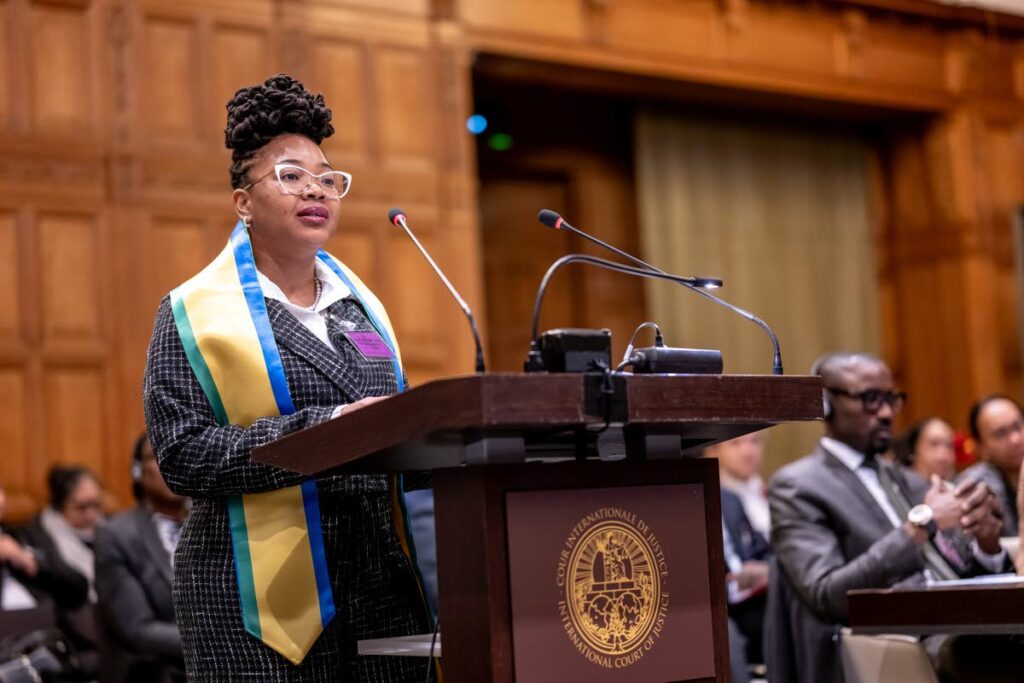
“This wicked problem of climate change, as we deem it in the environmental world, is colonisation on repeat.
“Let us never forget who bears the historical responsibility. To tackle an issue, we must go not to the symptoms but beyond to the root cause.”
She said climate change “disproportionately” impacts her country, “undermining fundamental rights enshrined in international law, including the right to self-determination and the permanent sovereignty of peoples over their natural resources.
“What is right to life without the quality of life and its natural environment? What is a land without its people? What is a land without its tradition and culture?”
She continued, “In the case of my homeland, Hurricane Beryl displaced over 1,600 persons, thus creating who I deem climate refugees, ripping them from their homes, ripping them from their culture, their loved ones…”
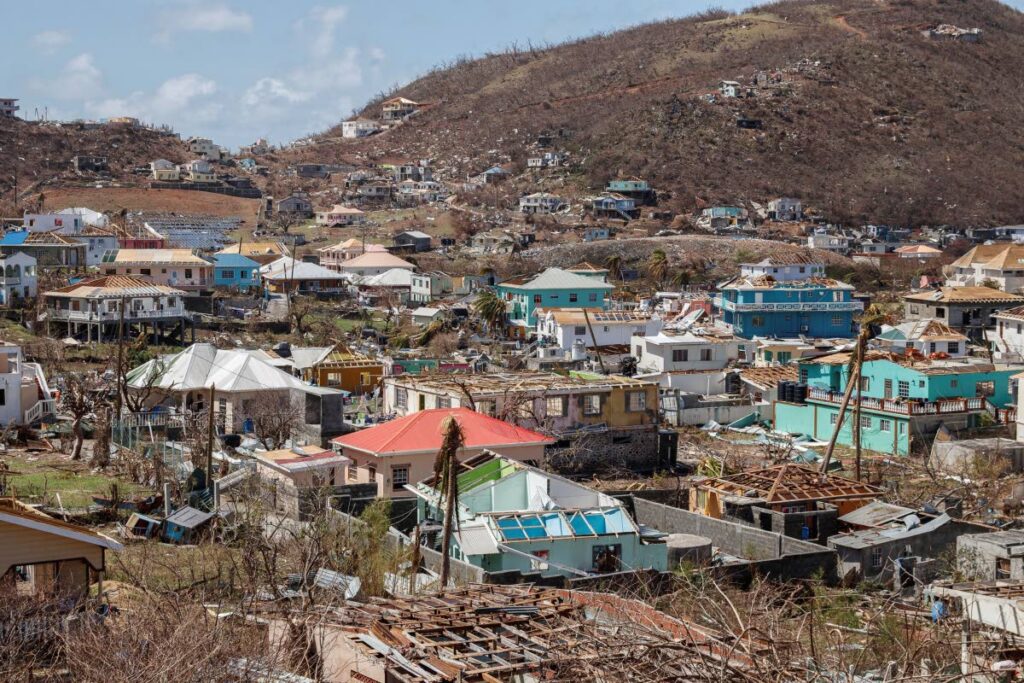
She said international financial institutions remain inadequately aligned to their financial needs.
“Recovery and rebuilding efforts are delayed by bureaucratic international processes, with funding for reconstruction often taking years to materialise, in stark contrast to the pace of recurring disasters. This failure perpetuates systemic injustice…It is unfair. It is unjust.
“States have an unequivocal obligation to act responsibly in addressing this crisis, recognising their historical contributions to the problem and their capacity to mitigate its impacts. The failure to provide support to vulnerable nations constitutes a violation of international law and an affront to the principles of equity, justice and human rights
TT lawyer: ‘A remarkable experience’
TT lawyer Dr Justin Sobion represented Grenada and St Vincent and the Grenadines at the oral hearings.
He told Sunday Newsday it was a “remarkable experience…And you felt part of history, and the right side of history.”
He said all the Caribbean countries as well as the Pacific states worked together, which he appreciated.
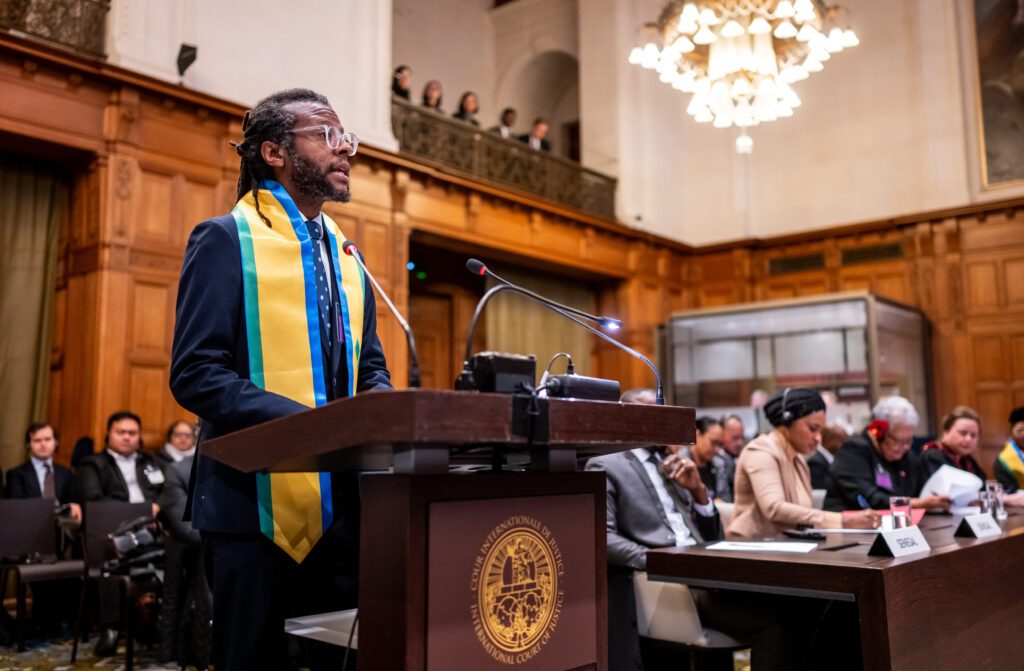
“This was our time to tell the court what is happening (with) rising sea levels, what is happening to our land, our culture, loss of cultural heritage.”
For some, it was their first time speaking at The Hague.
“Some of them said they were nervous at the beginning, even myself too, but once you start, it gets easy.”
He said the absence of TT, Guyana, as well as other Caricom countries like St Kitts and Nevis was felt. He believes their involvement would have further enhanced their pleas.
When Sunday Newsday asked the Planning Ministry, which is responsible for climate change matters, why TT did not give a written statement, it said the country was not invited to do so.
But the ICJ made an open call to all countries so personal invitations were not needed.
The court now has to deliberate on the matter, which will take several months. No clear date has been given yet for a final decision.
Sobion said success, in this case, would include the court agreeing about reparations, that there is no absolute ownership of the environment, that states must act as trustees of the atmosphere, and that states have an obligation to protect future generations from the climate crisis.

Comments
"Small islands, big voices – Caribbean voices unite at historic ICJ climate change hearings"